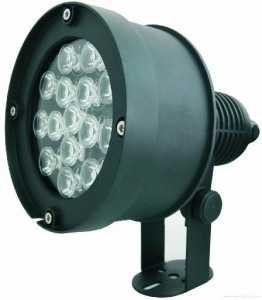Best IR Illuminators
 All CCTV cameras require a good deal of light in order to function properly. Some cameras have built in infrared (IR) illuminators or are sold as day/night cameras with night vision on board, but for the majority of installations, the camera becomes useless as night falls.
All CCTV cameras require a good deal of light in order to function properly. Some cameras have built in infrared (IR) illuminators or are sold as day/night cameras with night vision on board, but for the majority of installations, the camera becomes useless as night falls.
Floodlighting, a kind of solution
One solution is to install floodlighting or motion activated lighting to keep the camera functioning through the darker hours. However, running additional lighting through the night can prove to be costly, and if your installation is near to a residential neighbourhood the Clean Neighbourhoods and Environment Act 2005 dictates that any lighting which causes a nuisance to motorists or neighbours are illegal. This could result in a fine of up to £20,000 for businesses or £5,000 for domestic users.
IR illumination – a better solution
A far more elegant solution is to employ IR illumination units in conjunction with your daytime CCTV system. There are a number of models available as standalone units, varying in price from a few pounds to probably double what your camera cost you in the first place.
At the very inexpensive end of the market are standalone LED IR illuminators which are essentially a group of IR LED’s sprinkled on a printed circuit board and which claim to be suitable for up to 45m range. Most of these work on 12v systems and are probably fine for domestic camera systems using a standard black and white camera.
One of the problems with these LED illuminators is that the light is very directional and therefore the beam of illumination can be very narrow. If you are just illuminating a driveway, doorway or path then they will probably do the trick, but for any other application or the monitoring of a wider area its worth spending a bit more and going for a higher spec and wider angled IR illuminator.
Top brands on the market
Some of the better brands, as recommended by CCTV professionals, include Raymax and Iluminar.
The Raymax infrared range, although not inexpensive, certainly has a wide enough range of products and prices to suit most needs and budgets. Their cameras include a number of special features to help you get the most out of the system. These include adaptive illumination, which allows the user to vary the angle of illumination to suit the cameras field of vision and Active LED Life Control, which subtly controls the LED output to deliver consistent illumination and prolong the life of the LED bulbs. Raymax illuminators also include SMT LED technology and have wide illumination angles from 10 – 180 degrees. Because they use LED technology the running costs are low and the life expectancy of the units is around 10 years. The top end of the range claim to be able to light up to 370m, although for most applications this would be on the extreme side.
The Illuminar IR illuminators are available in short, medium and long range models to suit your application. Again they use SMT LED technology and have a wide range of angles available. As these are also LED units they also boast low running costs and long lifespans, which Illuminar have validated by giving a 5 year warranty, and they work up to a range of 208m, which although less than Raymax is perfectly adequate for the majority of installation. Illuminar also have dedicated IR illuminators available for use with IP cameras which are compatible with PoE systems.
However, all depends on your needs
There are a number of other high quality and reputable manufacturers around in addition to these two and the choice you make will be largely dependent on what you need to use it for. Unless you are buying an IR illuminator for a small, domestic project then steer clear of the LEDs on a PCB arrangement. Stick with brands you know and trust and with companies who have a track record of good customer service and after sales care and you won’t go wrong.
To summerise
Bear in mind that your camera will need to be compatible with IR lighting and have an infrared filter feature for IR illumination to work with it. IR cannot be used if you are trying to capture images through glass as the beam will be reflected back. Also be sure to choose the correct IR illumination range for the application you require, as subjects on the fringe of the range will be captured in, at best, very poor quality, whereas using a long range IR illuminator will burn the image out if the subject is too close to the unit.
